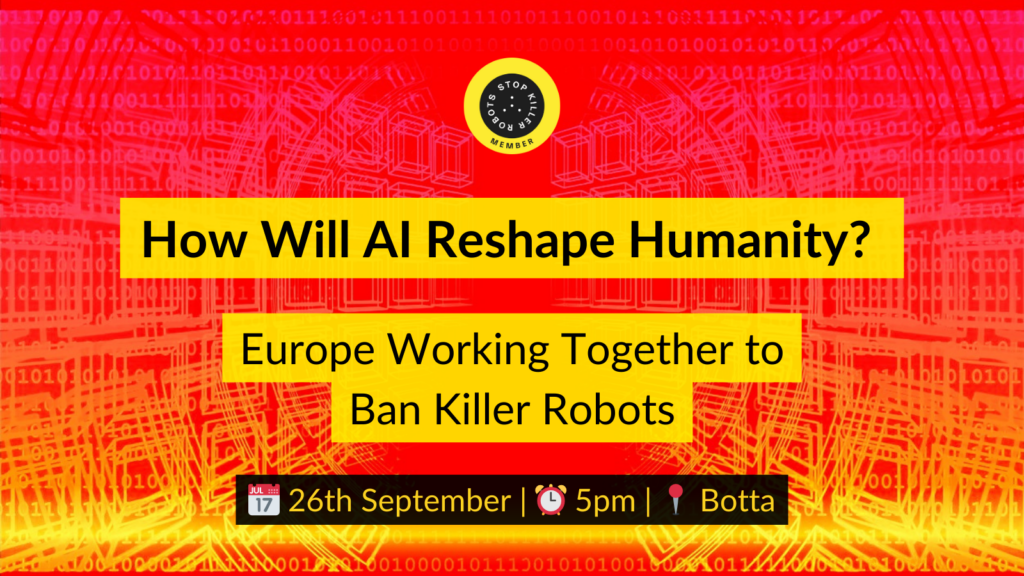How Will AI Reshape Humanity?
Europe Working Together to Ban Killer Robots

As artificial intelligence continues to develop, we find ourselves witnessing machines taking over roles previously performed by humans. Unless we take action, handing over life and death decisions to machines might become a reality.
Join us in the increasingly important discussion on autonomous weapons systems, also known as killer robots, which can identify targets and use force independently from human involvement.We welcome Automated Decision Research Manager Dr. Catherine Connolly to Helsinki where we will discuss the implications of automating decision-making in society. We will also hear the latest updates on development and use of such technology worldwide.
Following the keynote, experts from various fields will delve deeper into the topic. What are the ethical implications on deploying AI in weapons systems? Why should AI be regulated? Can we reach a treaty to ban killer robots before it’s too late? What is the role of Finland and the EU in preventing the risks related to AI technology and regulating killer robots?
Panelists:
- Dr. Catherine Connolly, Automated Decision Research Manager
- Rune Saugmann Andersen, Academy of Finland Research Fellow
- Laura Kankaala, Threat Intelligence Lead, F-Secure
- Professor Pekka Appelqvist, Research Director, Ministry of Defence
Refreshments will be served at the beginning of the event.
This event is open to anyone interested in the future, security, and the societal impacts of AI. It will also be streamed live online.
Introducing the Speaker
Dr Catherine Connolly is the Automated Decision Research Manager. She holds a PhD in International Law & Security Studies and a BA in International Relations from Dublin City University, Ireland, and an MA in War Studies from King’s College London, England.
Prior to joining the Stop Killer Robots team in 2021, Catherine worked in the School of Law and Government at Dublin City University, where she researched and lectured in critical security studies, international relations and international law. Catherine was awarded a Government of Ireland Postdoctoral Fellowship by the Irish Research Council, and was the recipient of a DCU School of Law and Government PhD Scholarship.
Elements of Catherine’s research have been published in the Journal of Conflict and Security Law, Third World Approaches to International Law Review, Irish Studies in International Affairs, Teen Vogue, and The Irish Times, among others. She has delivered lectures to the Joint Command and Staff Course at the Irish Defence Forces Military College, and has presented on her work at numerous seminars and conferences.
Catherine has also worked with the Irish Department of Foreign Affairs and Trade at the Embassy of Ireland in London. Catherine is based in Dublin, Ireland.
Meet the Panelists
Rue Saugmann is researching how visual and digital dynamics reconfigures security politics. Rune has investigated how videos participate in constituting security events, image-based open-source intelligence practice, art photography, lethal autonomous weapons systems, and computer vision systems in security practice. Currently interrogating the roles machine vision play in surveillance. Rune edited the first volume dedicated to visual security, Visual Security Studies (Routledge 2018).
Rune’s research is available at saugmann.tumblr.com. Rune is an Academy of Finland Research Fellow, KONE grantee, and Gerda Henkel Stiftung awardee. He works at Tampere University, and is Docent in Media and Communications studies at Helsinki.
Laura Kankaala specialises in understanding the latest scams, hacks, malware and fraudulent behaviours in cyber crime and current threats, especially the ones that target everyday internet users. Her background primarily lies in offensive security – ethical hacking – before she was appointed as Threat Intelligence Lead at F-Secure. She’s also known for her appearance in Finnish hacking TV documentary Team Whack, as well as for her podcasts Turvakäräjät and We Need to Talk about InfoSec.
Professor Pekka Appelqvist works as a Research Director in the Ministry of Defence, Finland. He is responsible of the Research and Analysis Unit operating in the Defence Policy Department in the ministry. The unit deals with a wide range of defence research issues – research and science policy, new technologies, analysis of the operational environment and the society, administrative and funding issues, national and international cooperation, as well as topical research programs to serve foresight and knowledge base for strategic planning, decision making, and steering of the Defence Forces. In addition, the secretariat to facilitate the research and networking activities of the Scientific Advisory Board for Defence (MATINE) is also situated in the Research and Analysis unit.
Before joining the defence administration, Appelqvist worked for 15 years in an academic career at the Helsinki University of Technology (Aalto University). He received his doctoral degree in the year 2000, and qualified as a professor in 2006. His research interest have mainly dealt with mobile robotics and autonomous systems, leading later into military applications, as well as their international regulatory process as an arms control issue.
Organiser
Stop Killer Robots Finland is a part of a coalition of 241 non-governmental organizations in 70 countries. With growing digital dehumanization, the Stop Killer Robots coalition works to ensure human control in the use of force and calls for new international law on autonomy in weapons systems.

